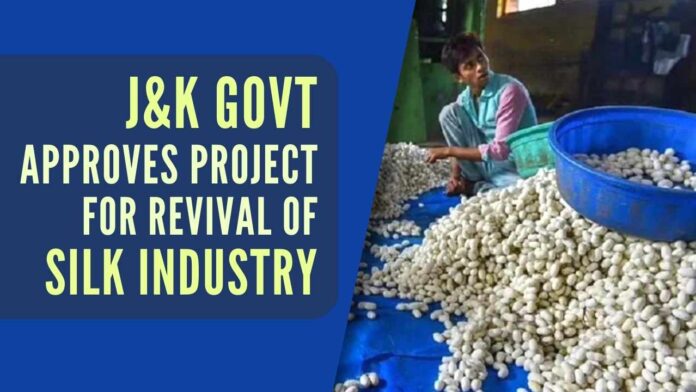
J&K govt to make plans for revival and modernization of silk industry
The Jammu and Kashmir government has approved an ambitious project worth Rs.91 crore envisaging the revival of the silk industry in the UT through technological interventions, officials said on Sunday.
Sericulture or silk production has a long-established history and market, local as well as foreign, in Jammu and Kashmir. The region is known for its high-quality bivoltine silk and has the potential to become a major silk-producing hub in the country.
However, the industry has faced challenges in recent years and there was a need for its development and modernization in order to meet the growing demand for superior silk which can match and replace not only the silk being imported to the country but also compete in export requirements.
The project, which contains end-to-end interventions – right from the availability of mulberry leaves to better seed and worm production, and finally augmentation of reeling facilities – shall double the number of cocoons produced in J&K and boost value addition by establishing a state-of-the-art automatic reeling facility at Jammu, they said.
“Sericulture is the only cash crop that ensures significant returns in a short span of time, earning it a special place in the rural economy. Although the state produces high-quality bivoltine cocoons, productivity and total cocoon output are low,” Additional Chief Secretary, Agriculture Production, Atal Dulloo, said while highlighting the broad contours of the sanctioned project.
Similarly, cocoon yields are half of the national average and over the past few years, the output from the sector has been shrinking. Improving seed quality, rearing facilities, and cocoon processing will provide a huge shot in the arm for the sector and improve income at farm levels, he added.
Technological interventions to strengthen sericulture in J&K is one among the 29 projects, which were approved by the Jammu and Kashmir administration after being recommended by the UT Level Apex Committee for holistic development of Agriculture and Allied Sectors in UT of J&K.
The major interventions that are being undertaken in the project included planting 10 lakh new mulberry plants in tree mode, doubling the silkworm seed production from 8 lakh to 16 lakh, increasing cocoon production from 700 MT to 1,350 MT, establishing 100 new chawki rearing centres for the supply of chawki worms to seri farmers, giving employment to 7000 new silkworm farmers and skill development of existing 15,000 farmers.
Marketing and value-added support are also being created through the establishment of a high-value enterprise in the form of an Automatic Reeling Machine (ARM) which will directly benefit 2000 seri-farmers. The state-of-the-art machine will allow the production of international quality silk within the UT fetching better prices for our cocoons.
[With Inputs from IANS]
PGurus is now on Telegram. Click here to join our channel and stay updated with all the latest news and views
For all the latest updates, download PGurus App.
- Centre appoints Sr IPS officer Nalin Prabhat as NSG Chief, IPS Sapna Tewari to take over as Special Director IB - April 19, 2024
- Annamalai casts vote; says will register historic win, people of TN with PM Modi - April 19, 2024
- Oil prices surge as reports of Israeli strike on Iran roil markets - April 19, 2024











Govt unable to implement labelling of fabric on lines of –
a) artificial silk
b) China silk
c) natural silk
for everything sold in market is synthetic silk. Ordinary labelling cannot enforce, Govt talks big.